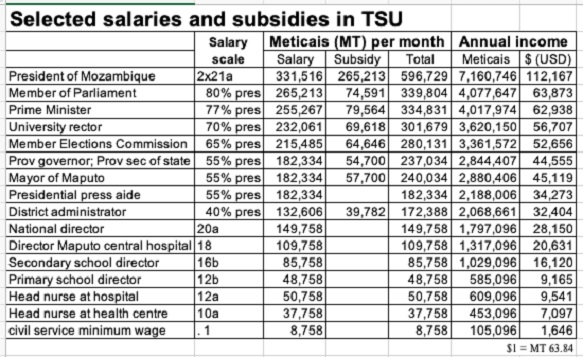Mozambique: EU to disburse 27 million Euros to fight wildlife crime
Mozambique: Minimum wage double for civil service; top wages now public – By Joseph Hanlon

Map: VOA Portugues
In this issue
Minimum wages
- Civil service minimum doubled
- Other minimum wages up 10-14%
Unified government wage table (TSU)
- Makes top wages public
- President earns $112,167 per year
- Delays as experience vs education debate rages
Civil service minimum wage doubled to $1,646 per year; President earns $112,167
A unified government wage table (Tabela Salarial Única, TSU) was introduced on 13 July and then suspended on 19 July because of protests by civil servants about serious inconsistencies and conflicts over changes. But at the bottom and top there will be no changes.
The minimum wage, paid to 21,000 civil servants, was almost doubled, from $70 per month to $137 per month, and is being paid this month (July).
President Nyusi will have a wage of $5193 per month plus subsidy of $4154, totalling $9347 per month or $112,167 per year. Members of parliament get 80% of the presidential salary and a much smaller subsidy, coming to $5323 per month. The Prime Minister earns just below that, $5245. Governors and the mayor of Maputo receive around $3700. A national director receives $2346 per month. The director of Maputo Central Hospital is at $1719, and a primary school head at $769. More details are in the table below.
By Maputo standards these salaries are not high. Senior people in NGOs and commerce receive more than the Prime Minister, and some more than the President.
The single wage table is an attempt to pull together 108 different wages tables and a whole range of supplements and subsidies, which covers everyone from the President of Mozambique to those on the civil service minimum wage – and makes these salaries public. Senior officials with management responsibilities have received housing and other subsidies and these are now combined into a single subsidy table. For the most senior officials, wages and subsides are a percentage of those received by the President.
The TSU has 21 wage levels, each with three subdivisions. All the wages have been announced, but so far job titles have only been given for levels 10-21 – those with management responsibilities. It is not yet public where ordinary teachers, nurses, etc are within levels 2-9.
This table and is based on the February TSU law and the tables announced on 13 July. The three key documents (in Portuguese) have been pulled together HERE .
There are 382,728 employees in the public administration, but so far TSU wages have only been worked out for 80% of them (306,000). The government has promised that in no case will anyone earn less with the TSU than they were earning previously. (TVM 13 July, Savana 15 July)
Minimum wages up 10-14%, after three year freeze
Non-government minimum wages were announced on 26 April, and were an increase in US dollar terms of 10-14% for most categories. Minimum wage increases for non-government workers only match the inflation rate, which reached 10.8% in June and will continue to rise, according to the Bank of Mozambique. (Carta de Moçambique 21 July) The civil service minimum was only announced on 13 July, and was a 97% increase.
Minimum wages peaked in 2014 and fell until 2017 due to the economic crisis and devaluation caused by the revelation of the $2 bn secret debt. There was a partial recovery in 2018, then no increase for three years 2019-21. Most minimum wages are still 15-25% below the 2014 peak in $ terms.
The civil service minimum wage was similar to industry in 2008-10, then was the same as the much lower agricultural wage until last year. The doubling brings it back to the level of the industrial wage.
The number of minimum wages has increased over two decades to 17, and the chart below gives minimum wages for a sample of five, range from the lowest – agriculture – to the highest – banking. The chart runs from 1996, when the IMF was forced by a donor protest to allow a minimum wage increase.
We delayed our annual minimum wage and exchange rate supplement until the civil service minimum wage was announced. The complete table of minimum wages going back to 1996 and US$ and South African Rand exchange rates going back to 2006 is HERE. The dollar exchange rate has been kept constant at $1 = MT63.8 for the past year.
How to value age and education causes TSU backlash and delay
Two issues arise with any salary scale. First is job equivalence – is job X more valuable than job Y? Is a member of parliament really worth more money than the Prime Minister?
Second is how experience and qualifications are valued, and the balance between them. In the previous system promotion was largely based on academic qualifications, so many people tried to gain Masters degrees simply to have a higher salary. And some private universities made that easy. Now these people complain that the new system gives them less extra salary for their degree, and studying was a waste of their time. On the other hand, one of the complaints against the old system was that it overvalued academic qualifications, and undervalued professional experience.
Despite complaints the academic qualifications are less valued, the new scale does seem intended to encourage young people with higher degrees to join the civil service. But this creates another issue – older people with substantial experience and tacit knowledge may earn less than younger subordinates with academic qualifications.
The points system: Although the TSU is meant to be a simplification, it contains a very complicated points system, which takes into account four factors. Time in the public service ranges up to 23 points for more than 15 years in the civil service. Similarly time in a technical career goes up to 16 points. But age is designed to benefit younger people – 18 to 28 years gains 20 points while over 50 gains only 5. In terms of education, basic schooling gains 0 to 5 points, but Licenciatura, Masters and PhD gain 31-34 points.
In the salary structure each category assumes a certain number of points. A job with a basic minimum wage assumes 28 points, a head nurse (scale 10) 55 points, and a national director (scale 20) 85. So a head nurse with more than 55 points would be moved up to a higher wage scale.
Experience is valued, but this is reduced because younger people can more easily gain promotion. The battle is over the balance, and the size of the outcry suggests there was not enough consultation.
The laws, tables, and an explanation of the points system, in all their complexity, are HERE.
By Joseph Hanlon














Leave a Reply
Be the First to Comment!
You must be logged in to post a comment.
You must be logged in to post a comment.